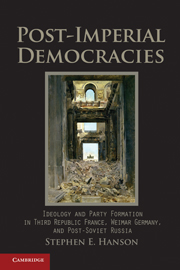 Post-Imperial Democracies
Post-Imperial Democracies Book contents
2 - A Weberian Theory of Ideology
Published online by Cambridge University Press: 05 June 2012
Summary
Many of the central theoretical themes in Weber's work as analyzed in the previous chapter are succinctly conveyed in one of Weber's most widely cited passages, in ways not always evident from a merely cursory reading: “Not ideas, but material and ideal interests, directly govern men's conduct. Yet very frequently the ‘world images’ that have been created by ideas have, like switchmen, determined the tracks along which action has been pushed by the dynamic of interest.” To begin with, as Weber makes clear here, his sociology is by no means an “idealist” one: he does not see “ideas” as somehow possessing causal force in the absence of any connection to everyday individual interests. In terms of Weber's four types of social action, then, habit and instrumental rationality – that is, time-bound forms of human conduct – are most relevant for explaining the ordinary patterns of daily social life. Of the two “time-transcendent” types of social action, moreover, nondeliberative affect – that is, motivation from heightened emotional states – is probably more common among ordinary social actors than the value-rational defense of cherished ideals.
Nevertheless, as Weber's metaphor implies, at critical historical turning points, value-rational commitments to political ideals may play a decisive role in channeling individual behavior motivated by instrumental interests of various types (whether these interests be “material” or “ideal”).
- Type
- Chapter
- Information
- Post-Imperial DemocraciesIdeology and Party Formation in Third Republic France, Weimar Germany, and Post-Soviet Russia, pp. 29 - 56Publisher: Cambridge University PressPrint publication year: 2010


